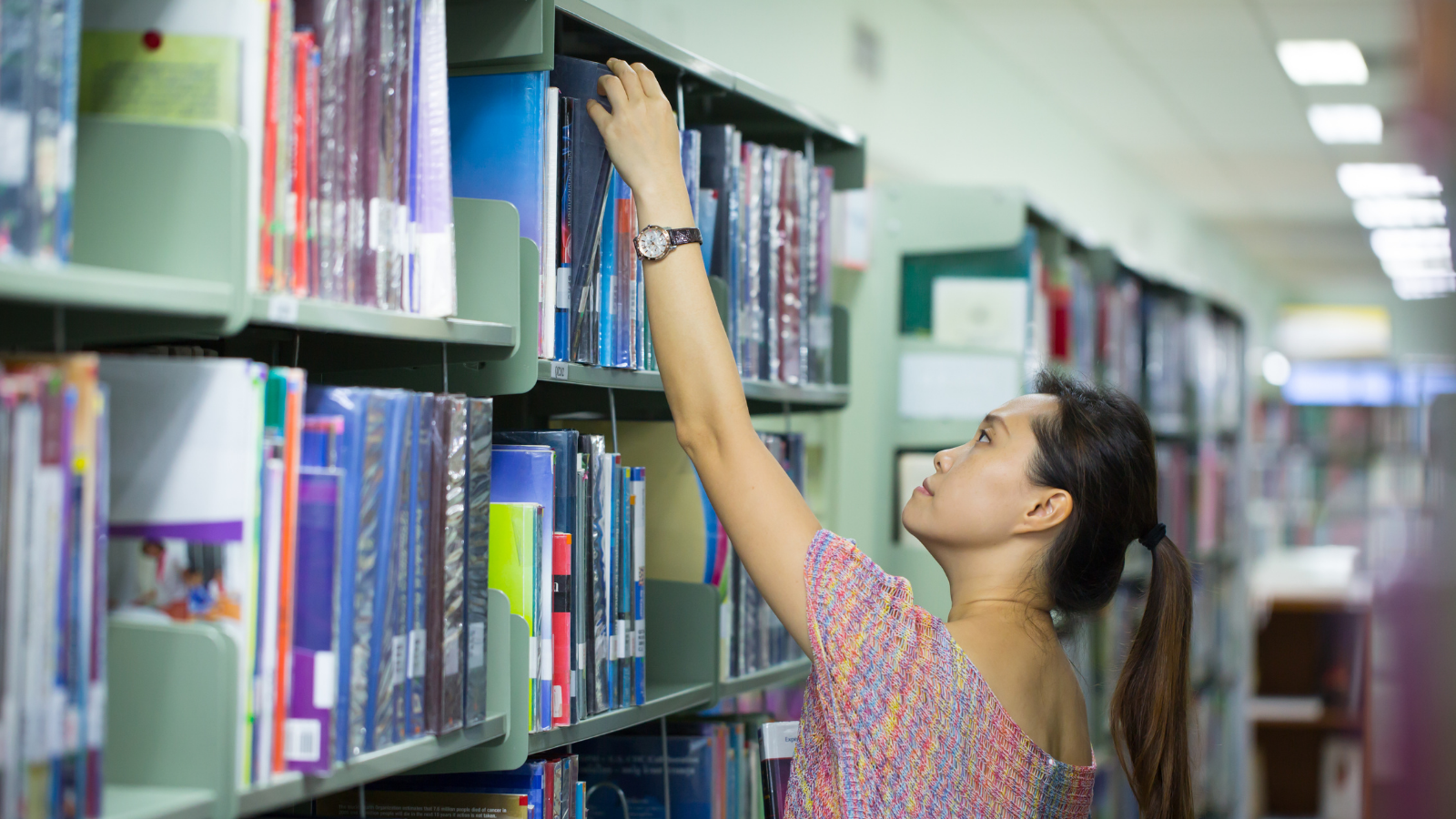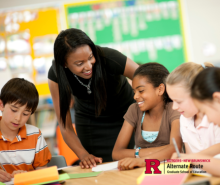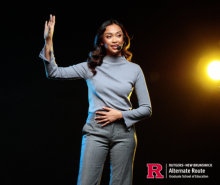Library Resources to Support LGBTQ+ Educators and Students

For LGBTQ+ youth, libraries represent a safe haven. A place to relax, browse resources, work on homework and find solace in a quiet space where patrons keep to themselves. For LGBTQ+ youth that do not have a support network or proper mentors to discover more about their identities and community, libraries can help fill those gaps with resources.
“Books are a critical part of proving to our LGBTQ students that we recognize and value them, and that we don’t question their right to exist in school or anywhere else,” says National Council of Teachers of English member Vanessa Perez wrote in 2019. “An individual teacher may not be able to change curriculum to include LGBTQ lives and learning, yet one teacher can choose books for a classroom or school library.”
For LGBTQ+ students, libraries may be one of the few spaces where they feel accepted. According to Human Rights Campaign’s 2018 LGBTQ+ Youth Report, 78 percent of LGBTQ+ youth are not out to their parents because they have heard their families speak negatively about their identities. Of those that are out to their families, 48 percent say their families make them feel bad about their identity.
That stress is compounded when students do not have support systems at home or in the classroom. Since 1999, the organization GLSEN has been gathering data every two years on LGBTQ+ youth through its National School Climate Survey. According to GLSEN’s 2019 report, 59.1 percent of students (ages 13-21) surveyed felt unsafe at school because of their sexual orientation and 77.6 percent actively avoided school functions. Nearly all students (98.8 percent) have overheard homophobic remarks at school.
School administration has a responsibility to provide safe and comfortable learning for students, however, the report found 59.1 percent of students surveyed said they experienced discriminatory policies. Some examples of these include being disciplined for public displays of affection at a higher rate than their cisgender and/or heterosexual peers, being denied from using bathrooms that align with their gender identity, as well as being denied from using their preferred name and pronouns.
These policies also affect LGBTQ+ educators, who often have to hide their identities or face pushback when they are out in the workplace. In December 2021, a Wisconsin kindergarten teacher hung a Pride flag in her classroom and was asked to take it down. When she refused, the district suspended her for a day and removed the flag in her absence. (The good news is students and staff wore rainbows on her suspension day to show support.)
But, as Vanessa Perez stated above, resources like books can fill these gaps and libraries are places where these resources can be accessed safely. As technology has evolved, library resources have become even easier to access, with books and multimedia available through digital apps.
To provide a safe and comfortable resource for our community’s students, we’ve rounded up some of these library-based resources, as well as some content recommendations that show accurate LGBTQ+ representation.
Please note: A few of these resources include mature themes; make sure to vet the content before recommending it to students.

Resources to support LGBTQ+ Educators and Students
The most important part of discovering new resources is knowing where to find them. There are plenty of apps and websites that make it easier to find the information, artists and titles students need to explore the LGBTQ+ experience and support artists within the community. Below are apps that partner with libraries to provide free content to library card holders.
Freegal has been a library go-to for music sharing since 2010. It has a collection of more than 16 million songs from more than 100 countries, including classic and modern genres and artists. Its collection also includes audiobooks and music videos. Many libraries in New Jersey have a Freegal subscription, which means library patrons can access music anytime they want.
This media service is offered at many libraries and is valuable to anyone who regularly uses screens. Through Hoopla, libraries provide patrons with access to movies, music, audiobooks, ebooks, comics and TV shows. Those that take advantage of Hoopla can skip the “on hold” line and watch up to 10 titles per month.
Through its partnership with libraries, Kanopy offers ad-free streaming on thousands of film titles, with new films being added monthly. Similar to the above resources, users sign up with their library card information.
Ebooks, audiobooks, magazines and more are featured resources on OverDrive. Currently, OneDrive offers the biggest digital catalog in the world, partnering with more than 76,000 libraries and schools in 94 countries. Their content catalog has millions of titles offered in more than 100 languages.
Films and Documentaries
It is important for LGBTQ+ youth to see themselves depicted realistically in media, and within the past decade, more content with LGBTQ+ stories is receiving attention. In 2013, Orange is the New Black put a spotlight on incarcerated LGBTQ+ characters - many of them characters of color. The show was groundbreaking, specifically for centering the trans inmate experience, which was aptly portrayed by actor Laverne Cox. Through this opportunity, Cox went on to become the first transgender person to be nominated for a Primetime Emmy Award for acting, as well as the first transgender person to appear on the cover of Time.
Momentum for highlighting LGBTQ+ stories continued. In 2017, Moonlight - a film that tackled themes like Black masculinity with a queer lens - won Best Picture at the 89th Academy Awards. And in 2019, the queer French film Portrait of a Lady on Fire was highly acclaimed on the international level, receiving Best Screenplay at the Cannes Film Festival.
By viewing LGBTQ+ content and not viewing it as a separate category, these stories can introduce people to new perspectives, help people feel seen and provide a valuable learning experience. Below are some recommended titles.
- Disclosure
- Free Cece
- Go Fish
- How to Survive a Plague
- Looking for Langston
- Madchen in Uniform
- Moonlight
- My Beautiful Laundrette
- Nitrate Kisses
- Pariah
- Paris is Burning
- The Queen
- Silverlake: The View from Here
- Tangerine
- The Times of Harvey Milk
- Tongues United
- Word is Out
- Yossi & Jagger
Digital books
With digital resources that offer access to millions of titles, there is a big opportunity to learn about LGBTQ+ history, perspectives and important figures. The apps and websites listed above open up a world of representation to LGBTQ+ students and educators. For students feeling like they don’t fit in, reading about historical figures or fictional characters that are like them offer a sense of belonging.
Below is a list of books and magazines that focus on LGBTQ+ identities:
Ages 5-10:
My Maddy
- Julián Is a Mermaid
- Pride: The Story of Harvey Milk and the Rainbow Flag
- Stonewall: A Building, an Uprising, a Revolution
- The Misadventures of the Family Fletcher
Ages 10-13:
- The Whispers
- To Night Owl from Dogfish
- Middle School’s a Drag, You Better Werk!
- This Is Our Rainbow: 16 Stories of Her, Him, Them, and Us
Ages 13+
- Heartstoppper
- We Are OK
- I’ll Give You the Sun
- Juliet Takes a Breath
- Beyond the Gender Binary
- Last Night at the Telegraph Club
Music
LGBTQ+ artists are behind some of music’s biggest moments and movements. Elton John, Freddie Mercury, Dusty Springfield, David Bowie. These artists have all influenced the music we listen to today. Little Richard’s charisma and flair in the 1940s and 1950s influenced Elvis’ most famous moves, and Lady Gaga may not exist in her current iteration without Bowie and Mercury paving the way.
In the 1960s and 1970s, glam rock popularized androgynous and gender-bending looks the LGBTQ+ community was already known for, and that trend helped influence many looks in the ‘80s. Remember Madonna’s famous “Vogue” video in the early ‘90s? That was inspired by ball culture, which has more recently arisen through the television show, Pose.
Throughout time, LGBTQ+ musicians - specifically those of color - have created some of culture’s biggest trends and paved the way for other artists. And as a result, modern LGBTQ+ artists have more opportunities and visibility.
Below are some modern artists that are part of the LGBTQ+ community.
- Brandi Carlile
- Tracy Chapman
- Claud
- Dorian Electra
- Big Freedia
- Laura Jane Grace
- Brittany Howard
- Hayley Kiyoko
- Lil Nas X
- Janelle Monae
- Frank Ocean
- Orville Peck
- Rina Sawayama
- The xx

Crisis Support
Did you know libraries are there to help in times of crisis? Many local libraries have pages dedicated to LGBTQ+ resources, including crisis support and people can always reach out to a librarian for help. Below are a few resources libraries recommend for LGBTQ+ individuals.
- 2NDFLOOR
- A confidential and anonymous helpline for New Jersey's youth and young adults.
- Kaleidoscope
- This organization offers safe and affirming mental-health care to LGBTQ+ individuals.
- Trans Lifeline
- Trans people in crisis can reach out to Trans Lifeline, a peer-to-peer network that offers emotional and financial support.
- The Trevor Project
- Counselors that are trained on LGBTQ+ youth issues are available to talk via phone, text or live chat at any time.
- Counselors that are trained on LGBTQ+ youth issues are available to talk via phone, text or live chat at any time.
If you’re considering following your dream of teaching, Rutgers Alternate Route can offer you the support and training you need to succeed. Be sure to follow Rutgers Alternate Route on Twitter and sign up for Alternate Route’s monthly newsletter for more information and stories from the field of education.

 Lindsay Patton is a digital communications professional who specializes in social media, writing, digital marketing, e-commerce, podcasting and other content-focused endeavors. Since 2019, she has assisted Alternate Route with its marketing strategy to help the program reach new audiences. As a result of this collaboration, Alternate Route has introduced Lindsay to many of New Jersey's talented educators, who have had a direct influence on her own classroom strategies as an adjunct professor. She is grateful for the opportunity to create meaningful content that helps increase equity within classrooms and is inspired by Alternate Route's hardworking team.
Lindsay Patton is a digital communications professional who specializes in social media, writing, digital marketing, e-commerce, podcasting and other content-focused endeavors. Since 2019, she has assisted Alternate Route with its marketing strategy to help the program reach new audiences. As a result of this collaboration, Alternate Route has introduced Lindsay to many of New Jersey's talented educators, who have had a direct influence on her own classroom strategies as an adjunct professor. She is grateful for the opportunity to create meaningful content that helps increase equity within classrooms and is inspired by Alternate Route's hardworking team. 





